15 start with O start with O
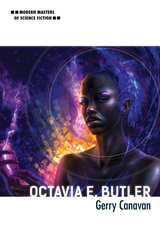
Gerry Canavan offers a critical and holistic consideration of Butler's career. Drawing on Butler's personal papers, Canavan tracks the false starts, abandoned drafts, tireless rewrites, and real-life obstacles that fed Butler's frustrations and launched her triumphs. Canavan departs from other studies to approach Butler first and foremost as a science fiction writer working within, responding to, and reacting against the genre's particular canon. The result is an illuminating study of how an essential SF figure shaped themes, unconventional ideas, and an unflagging creative urge into brilliant works of fiction.

In Octavio Paz, Nicholas Caistor takes a fresh look at Paz’s exquisite poetry and fascinating life. Born during the Mexican Revolution, Paz spent his youth fighting to free Mexico from the ideologies of both the left and right. He traveled to the United States, then to Spain, where he fought with the Republicans against Franco's Nationalists. He eventually served as a diplomat in India before returning to his homeland in 1968, where he again became a vocal opponent of the government. As Caistor demonstrates, Paz’s personal journey in those years was as exciting as his public life. He details here the multiple marriages and passionate friendships that inevitably made their way into Paz’s poetry.
Both concise and insightful, Octavio Paz reveals the life that informs a poetry that is deeply expressive—and distinctly political.
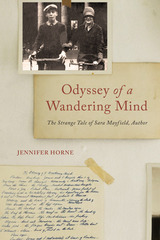
Sara Mayfield was born into Alabama’s governing elite in 1905 and grew up in a social circle that included Zelda Sayre, Sara Haardt, and Tallulah and Eugenia Bankhead. After winning a Goucher College short story contest judged by H. L. Mencken, Mayfield became friends with Mencken and his circle, then visited with Scott and Zelda Fitzgerald and hobnobbed with the literati while traveling in Europe after a failed marriage. Returning to Alabama during the Depression, she briefly managed the family landholdings before departing for New York City where she became involved in the theater. Inventing a plastic compound while working on theatrical sets, she applied for a patent and set her sights on a livelihood as an inventor and businesswoman. With the advent of World War II, Mayfield returned to her family home in Tuscaloosa where she expanded her experiments, freelanced as a journalist, and doggedly pursued a bizarre series of military and intelligence schemes, prompting temporary hospitalization. In 1945, she mingled with a host of cultural figures, including Frida Kahlo, Diego Rivera, Orson Welles, Rita Hayworth, and even a young John F. Kennedy, while reporting on the creation of the United Nations from Mexico and California. Back in Tuscaloosa after the war, however, she struggled to find her way with both work and family, becoming increasingly paranoid about perceived conspiracies arrayed against her. Finally, her mother and brother committed her to Bryce Hospital for the Insane, where she remained for the next seventeen years.
Throughout her life, Mayfield kept journals, wrote fiction, and produced thousands of letters while nursing the ambition that had driven her since childhood: to write and publish books. During her confinement, Mayfield assiduously recorded her experiences and her determined efforts—sometimes delusional, always savvy—to overturn her diagnosis and return to the world as a sane, independent adult. At 59, she was released from Bryce and later obtained a decree of “having been restored to sanity,” enabling her to manage her own financial affairs and to live how and where she pleased. She went on to publish noteworthy literary biographies of the Menckens and the Fitzgeralds plus a novel based on the life of Mona Lisa, finally achieving her quest to become the author of books and her own life. In Odyssey of a Wandering Mind, noted writer Jennifer Horne draws on years of research and an intimate understanding of the vast archive Sara Mayfield left behind to sensitively render Mayfield’s struggle to move through the world as the person she was—and her ultimate success in surviving to define the terms of her story.
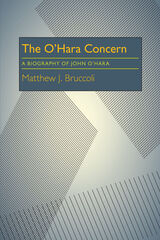

Now available as an audio CD, in Eudora Welty's own voice, or as a book.
Eudora Welty was born in 1909 in Jackson, Mississippi. In a "continuous thread of revelation" she sketches her autobiography and tells us how her family and her surroundings contributed to the shaping not only of her personality but of her writing. Homely and commonplace sights, sounds, and objects resonate with the emotions of recollection: the striking clocks, the Victrola, her orphaned father's coverless little book saved since boyhood, the tall mountains of the West Virginia back country that become a metaphor for her mother's sturdy independence, Eudora's earliest box camera that suspended a moment forever and taught her that every feeling awaits a gesture. She has recreated this vanished world with the same subtlety and insight that mark her fiction.
Even if Eudora Welty were not a major writer, her description of growing up in the South--of the interplay between black and white, between town and countryside, between dedicated schoolteachers and the public they taught--would he notable. That she is a splendid writer of fiction gives her own experience a family likeness to others in the generation of young Southerners that produced a literary renaissance. Until publication of this book, she had discouraged biographical investigations. It undoubtedly was not easy for this shy and reticent lady to undertake her own literary biography, to relive her own memories (painful as well as pleasant), to go through letters and photographs of her parents and grandparents. But we are in her debt, for the distillation of experience she offers us is a rare pleasure for her admirers, a treat to everyone who loves good writing and anyone who is interested in the seeds of creativity.
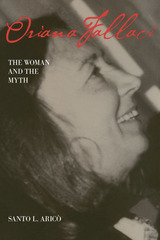
Internationally acclaimed as a journalist, war correspondent, interviewer, and novelist, Oriana Fallaci’s public persona reached almost mythic proportions. It is a myth Fallaci herself created, according to Santo L. Aricò, who probes the psychological forces that motivated one of the twentieth century’s most famous and successful women writers.
Using his own extensive interviews with the writer, Aricò maps out Fallaci’s journey through life, paying particular attention to her ongoing and painstaking attempts to establish her own mythical status. He first examines her career as a literary journalist, emphasizing the high quality of her writing. From there, he concentrates on how Fallaci’s personal image began to emerge in her writings, as well as the way in which, through her powerful narratives, she catapulted herself into the public eye as her own main character.
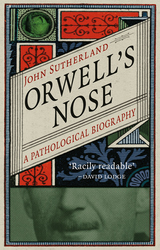
Sutherland airs out the odors, fetors, stenches, and reeks trapped in the pages of Orwell’s books. From Winston Smith’s apartment in Nineteen Eighty-Four, which “smelt of boiled cabbage and old rag mats,” to the tantalizing aromas of concubine Ma Hla May’s hair in Burmese Days, with its “mingled scent of sandalwood, garlic, coconut oil, and jasmine,” Sutherland explores the scent narratives that abound in Orwell’s literary world. Along the way, he elucidates questions that have remained unanswered in previous biographies, addressing gaps that have kept the writer elusively from us. In doing so, Sutherland offers an entertaining but enriching look at one of the most important writers of the twentieth century and, moreover, an entirely new and sensuous way to approach literature: nose first.
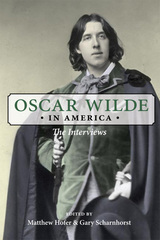
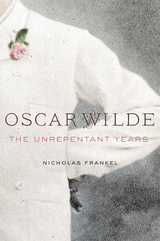
Nicholas Frankel presents a new and revisionary account of Wilde’s final years, spent in poverty and exile on the European continent following his release from an English prison for the crime of “gross indecency” between men. Oscar Wilde: The Unrepentant Years challenges the prevailing, traditional view of Wilde as a broken, tragic figure, a martyr to Victorian sexual morality, and shows instead that he pursued his post-prison life with passion, enjoying new liberties while trying to resurrect his literary career.
After two bitter years of solitary confinement, Frankel shows, Wilde emerged from prison in 1897 determined to rebuild his life along lines that were continuous with the path he had followed before his conviction, unapologetic and even defiant about the crime for which he had been convicted. England had already done its worst. In Europe’s more tolerant atmosphere, he could begin to live openly and without hypocrisy.
Frankel overturns previous misunderstandings of Wilde’s relationship with Lord Alfred Douglas, the great love of his life, with whom he hoped to live permanently in Naples, following their secret and ill-fated elopement there. He describes how and why the two men were forced apart, as well as Wilde’s subsequent relations with a series of young men. Oscar Wilde pays close attention to Wilde’s final two important works, De Profundis and The Ballad of Reading Gaol, while detailing his nearly three-year residence in Paris. There, despite repeated setbacks and open hostility, Wilde attempted to rebuild himself as a man—and a man of letters.
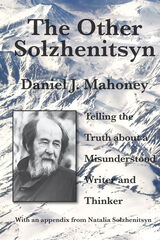
This book above all explores philosophical, political, and moral themes in Solzhenitsyn’s two masterworks, The Gulag Archipelago and The Red Wheel, as well as in his great European novel In the First Circle. We see Solzhenitsyn as analyst of revolution, defender of the moral law, phenomenologist of ideological despotism, and advocate of “resisting evil with force.” Other chapters carefully explore Solzhenitsyn’s conception of patriotism, his dissection of ideological mendacity, and his controversial, but thoughtful and humane discussion of the “Jewish Question” in the Russian – and Soviet twentieth century. Some of Solzhenitsyn’s later writings, such as the “binary tales” that he wrote in the 1990s, are subject to critically appreciative analysis. And a long final chapter comments on Solzhenitsyn’s July 2007 Der Spiegel interview, his last word to Russia and the West. He is revealed to be a man of faith and freedom, a patriot but not a nationalist, and a principled advocate of self-government for Russia and the West.
A final Appendix reproduces the beautiful Introduction (“The Gift of Incarnation”) that the author’s widow, Natalia Solzhenitsyn, wrote to the 2009 Russian abridgment of The Gulag Archipelago, a work that is now taught in Russian high schools.
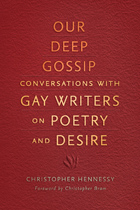
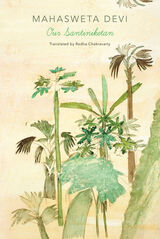
“Like a dazzling feather that has fluttered down from some unknown place. . . . How long will the feather keep its colours, waiting? The ‘feather’ stands for memories of childhood. Memories don’t wait.”
In Our Sanitikentan, the late Mahasweta Devi, one of India’s most celebrated writers, vividly narrates her days as a schoolgirl in the 1930s. As the aging author struggles to recapture vignettes of her childhood, these reminiscences bring to the written page not only her individual sensibility but an entire ethos.
Santiniketan is home to the school and university founded by the foremost literary and cultural icon of India, Rabindranath Tagore. In these pages, a forgotten Santiniketan, seen through the innocent eyes of a young girl, comes to life—the place, its people, flora and fauna, along with its educational environment, culture of free creative expression, vision of harmonious coexistence between natural and human worlds, and the towering presence of Tagore himself. Alongside, we get a glimpse of the private Mahasweta—her inner life, family and associates, and the early experiences that shaped her personality.
A nostalgic journey to a bygone era, harking back to its simple yet profound values—so distant today and so urgent yet again—Our Santiniketan is an invaluable addition to Devi’s rich oeuvre available in English translation.
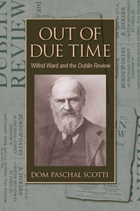

The writer Nakagami Kenji (1946-1992) rose to fame in the mid-1970s for his vivid stories about a clan scarred by violence and poverty on the underside of the Japanese economic miracle. Drawing upon the lives, experiences, and languages of the burakumin, the outcaste communities long discriminated against in Japanese society as a defiled underclass, Nakagami's works of fiction and nonfiction record with vitality and violence the realities—actual and imagined—of buraku culture.
In this critical study of Nakagami's life and oeuvre, Eve Zimmerman delves into the writer's literary world, exploring the genres, forms, and themes with which Nakagami worked and experimented. These chapters trace the biographical thread running through his works while foregrounding such diverse facets of his writing as his interest in the modern possibilities of traditional myths and forms of storytelling, his deployment of shocking tropes and images, and his crafting of a unique poetic language.
By bringing to the fore the literary urgency and social engagement that informed all aspects of Nakagami's creative and intellectual production, from his works of prose and poetry to his criticism, this book argues eloquently and effectively for us to appreciate Nakagami as a distinctive and relevant voice in modern Japanese literature.

Walter Van Tilburg Clark, author of the classic novel The Ox-Bow Incident, was one of the West’s most important literary figures, a writer who contributed mightily to the tradition of viewing the West realistically and not through the veil of myth and romance. As a comparatively young man, he published three novels and a collection of short stories, then remained almost silent for the rest of his life, the victim of a paralyzing case of writer’s block. Now Jackson J. Benson, one of the country’s foremost literary biographers, has produced the first full-length biography of this brilliant, enigmatic, and ultimately tragic figure. Based on widely scattered sources—personal papers and correspondence; interviews with family members, friends, and others; and Clark’s unpublished stories and poems—Benson’s biography focuses on Clark’s intellectual and literary life as a writer, teacher, and westerner. Benson masterfully balances his engaging account of the experiences, people, and settings of Clark’s life with a penetrating examination of his complex psyche and the crippling perfectionism that virtually ended Clark’s career, as well as offering up a thoughtful assessment of Clark’s place in Western writing. In these pages, Clark lives again, a warm, complex, and ultimately anguished human being. Benson’s remarkably astute and sensitive biography is destined to be the book that readers and researchers consult first for information about this major western writer.
READERS
Browse our collection.
PUBLISHERS
See BiblioVault's publisher services.
STUDENT SERVICES
Files for college accessibility offices.
UChicago Accessibility Resources
home | accessibility | search | about | contact us
BiblioVault ® 2001 - 2024
The University of Chicago Press









